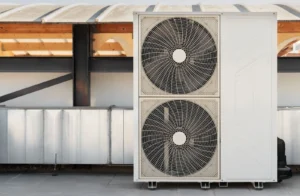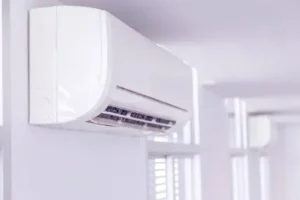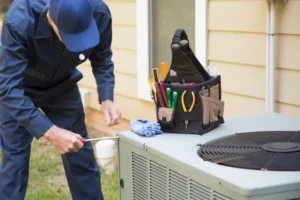Identify common issues causing your AC to stop working and how to fix them.
Nothing derails a hot day faster than an air conditioner not working. While many guides suggest checking the thermostat or replacing the filter, those quick fixes don’t always solve the problem. Air conditioning systems are complex, and several hidden issues can cause them to stop cooling properly. In this article, we’ll walk through some of the most common but often-overlooked problems, their symptoms, and what you can do about them. Use this as a practical AC troubleshooting guide to know what you can safely handle yourself and when it’s time to call in a professional.
Why Your AC Unit Might Not Be Working
When your air conditioner is not working, the cause isn’t always obvious. There are several overlooked issues that may require professional help, especially if you’ve been searching for “AC near me” and want to know what could really be wrong with your system.
Blocked Condensate Drain Line
Air conditioners cool your home and pull humidity out of the air. That moisture needs a place to go and that’s what the condensate drain line does. Over time, dirt, algae, or mold can clog the line, causing water to back up. When this happens, your AC may shut down entirely to protect itself or you might notice leaks around the indoor unit.
A quick homeowner fix is to use a wet/dry vacuum at the drain outlet or flush the line with vinegar. Steer clear of chemical drain cleaners as they often corrode or weaken pipes over time. If the line keeps clogging or if you already have water damage inside, it’s time for a technician to inspect the system and clear it properly.
Faulty Fan Motor (Indoor or Outdoor)
The fan motors inside your AC system keep air moving, both through your ducts and across the condenser outside. If a motor fails, you may notice weak airflow inside, or you might see the outdoor fan blade sit still while the unit hums. Sometimes, the motor overheats and shuts down temporarily, only to fail completely later.
Running your system in this condition can cause further damage to other parts such as the compressor. Since motors have to be replaced with the correct size, speed, and voltage, this isn’t a safe DIY project. If your fan isn’t spinning or airflow feels weak no matter what, call a professional technician to diagnose and replace the motor before the issue spreads.
Dirty Condenser Coils (Outdoor Unit)
Your AC’s outdoor condenser coil is essential for releasing heat. When it’s clean, the system runs efficiently. When dust, leaves, or grass clog the unit, your AC can’t cool your home efficiently. You’ll often notice longer run times, higher energy bills, or air that never feels as cool as it should.
Fortunately, this is one of the simpler issues to tackle. Always disconnect power before cleaning. Use a garden hose at gentle pressure to flush debris from the coil, working from the inside outward. Ensure a two-foot clearance around the unit, free of vegetation and clutter. For heavy buildup or bent fins, professional coil cleaning is recommended. Neglecting this step can shorten the life of your compressor and make your AC work twice as hard.
Incorrectly Sized AC Unit
If your system seems to run constantly but never cools properly or if it cools too quickly but leaves your home feeling damp, you may have the wrong size AC unit. An undersized unit will work overtime, leading to wear and tear, while an oversized unit cycles on and off too quickly, failing to remove humidity.
Both situations leave you uncomfortable and cost you more on energy bills. If you suspect your AC is improperly sized, a professional can evaluate it and recommend whether replacement or adjustments to your system are needed.
Leaking or Poorly Insulated Ductwork
Sometimes, the air conditioner itself is fine, but the cool air never makes it to your living spaces. Leaky ducts in your attic, basement, or crawlspace can let cold air escape before it reaches your vents. Poor insulation around ducts can also cause cooled air to warm up on its way to the rooms in your home.
Common signs are uneven room temperatures, spaces that never cool, or sudden spikes in energy bills. A professional HVAC technician can test your ducts for leaks, seal them properly, and add insulation if needed. Fixing this issue improves comfort, lowers energy costs, and reduces the strain on your AC unit.
Smart Thermostat or Sensor Malfunction
Smart thermostats are convenient, but when they malfunction, they can make your AC act strangely. If a sensor is out of place, reading direct sunlight, or has weak batteries, your thermostat may think the house is hotter or cooler than it really is. This can cause the AC to cycle at the wrong times or not turn on at all.
Start by checking your thermostat settings and replacing batteries if it uses them. Ensure remote sensors are placed away from vents and heat sources. If the thermostat is still inconsistent, the issue may be with wiring or calibration, which is best handled by a professional technician.
Wear and Tear on Belts & Bearings (Older Units)
Older AC systems may still use belts or mechanical bearings in the blower assembly. Over time, belts can crack, loosen, or slip, while bearings wear out and cause grinding or squealing noises. These sounds are a sign your AC is working harder than it should, and a breakdown may be around the corner.
Homeowners can visually inspect belts for cracks or excessive looseness, but adjusting tension or replacing bearings requires the right tools and knowledge. If your AC makes grinding, squealing, or screeching noises, it’s best to call in a professional to make repairs before the blower or motor fails completely.
Low Airflow from Blocked Vents or Registers
Something as simple as a sofa, heavy drape, or rug over a vent can block airflow, causing poor circulation and making certain rooms noticeably warmer. Dust buildup inside registers can also choke airflow. Start by checking all vents in your home, ensuring they’re open and not blocked.
Vacuum around registers to clear away dust. If airflow still feels weak across the entire house, the problem could be bigger such as a duct issue or failing blower motor. That’s when it’s time to schedule a professional inspection to rule out more serious causes.
Conclusion
If your air conditioner is not working, don’t just assume it’s a simple filter or thermostat problem. From clogged drain lines and dirty coils to faulty motors, duct leaks, and thermostat errors, many issues can stop your AC from cooling. Some problems are quick fixes, while others require professional expertise.
Visit On Point Service Company for fast, reliable AC troubleshooting and repair near you. Schedule your service now and restore comfort to your home.








